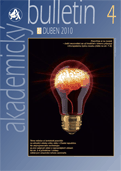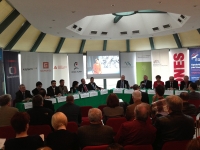Representatives of the Academy of Sciences of the CR were again successful in the prestigious scientific competition Česká hlava (Czech Intellect). The National Prize of the Government of the CR Česká hlava 2013 was obtained by the outstanding Czech historian prof. PhDr. František Šmahel, DrSc., dr.h.c. mult., from the Institute of Philosophy of the ASCR - Centre of Medieval Studies. The Prize of the Company Kapsch for Invention was taken by Ing. Ilona Müllerová, DrSc., from the Institute of Scientific Instruments of the ASCR for long-term and systematic research in the area of electron microscopy and the Prize of the Ministry of Education, Youth and Sports of the CR was received for his scientific work within his doctoral study programme by Mgr. Ondřej Maršálek, PhD.
Representatives of the Academy of Sciences of the CR were again successful in the prestigious scientific competition Česká hlava (Czech Intellect). The National Prize of the Government of the CR Česká hlava 2013 was obtained by the outstanding Czech historian prof. PhDr. František Šmahel, DrSc., dr.h.c. mult., from the Institute of Philosophy of the ASCR - Centre of Medieval Studies. The Prize of the Company Kapsch for Invention was taken by Ing. Ilona Müllerová, DrSc., from the Institute of Scientific Instruments of the ASCR for long-term and systematic research in the area of electron microscopy and the Prize of the Ministry of Education, Youth and Sports of the CR was received for his scientific work within his doctoral study programme by Mgr. Ondřej Maršálek, PhD., from the Institute of Organic Chemistry and Biochemistry of the ASCR for his study of the electron “dissolved in water” and the speed of these processes. The professional jury awarded also the original remote controlled mower and other scientists and innovators.
Winners of Česká hlava 2013
Laureate of the National Prize of the Government Česká hlava
Prof. PhDr. František Šmahel, DrSc., Dr.h.c. mult.

Institute of Philosophy of the ASCR - Centre of Medieval Studies Prague
Prof. František Šmahel is an outstanding Czech historian, who concentrates on the history of the Middle Ages, mainly on the era of the Luxembourg dynasty and the Czech Reformation. Hussitism has always been a large issue not only for Czech historians, but also the object of politicians and journalists. Šmahel has cleansed this important period in our history from the nationalist and political contexts and helped to map late medieval Central Europe clearly as a time of huge political, religious and cultural tensions before the coming period of modern times.
The research scope of Professor Šmahel is naturally much broader and touches on thé questions of Humanism, the Renaissance and the Reformation in Central Europe, further the history of medieval universities and medieval mythological and other depictions.
His critical and exhaustive approach to the sources and innovation in discovering new methodological instruments in the study of the late Middle Ages are intenrationally renowned and accepted with great respect. Few Czech historians can boast that his work is appreciated not only all over Europe but also in America.
In connection with his scientific activity, it is necessary to emphasise with Prof. Šmahel his organizational activities for the Academy of Sciences and other scientific and university institutions in the Czech Republic.
Prize of the Company Kapsch (Invention)
Ing. Ilona Müllerová, Dr.Sc.

Institute of Scientific Instruments of the ASCR, Brno
The prize was awarded for long-term and systematic research of electron microscopes. Czechs were the third in the world who managed to produce an electron microscope and Ing. Müllerová active built on this tradition of the research of electron optics at the Institute of Scientific Instruments Brno. She has designed and implemented a new form of the objective lens, which allows for a better detection of image signals for scanning electron microscopy.
The system works with electron beams in units of nanometers. She thus opened the possibility to study matter using entirely new contrasts with high spatial resolution. Scientists hence can see new materials using this new principle and without hyperbole received “new eyes”.
It is a revolutionary concept and a new method for showing samples using an electron beam with slow electrons.
The Institute of Scientific Instruments of the Academy of Sciences of the Czech Republic, where Mrs. Ing. Müllerová works, closely and successfully cooperates with commercial production companies headquartered in Brno and whose overall share in worldwide production of electron microscopes is greater than 30%. They are FEI Czech Republic s.r.o., DELONG INSTRUMENTS a.s. and TESCAN s.r.o. Also other global producers build on the research method of scanning electron microscopy with slow electrons from the Institute of Scientific Instruments in Brno and use this method in their microscopes and so increase their application possibilities.
Prize of the ČEZ Group (Patria)
Prof. Mikuláš Popovič MD, PdD.
Institute of Human Virology and University of Maryland, Baltimore
Professor Mikuláš Popovič was born a Czechoslovak citizen in then Ruthenia. He studied medicine in Bratislava and in the 1980s left for a stipend in the USA and considering the problems of his return to his homeland he decided to immigrate to the USA. He remained in close contact with his homeland despite that and became inter alia a foreign member of the Learned Society of the CR.
His first discovery showed the responsibility of a human retrovirus for the emergence of leukaemia of mature T cells (white blood cells from the group of lymphocytes). From this discovery, the path led to determination of the retroviral agent of the AIDS illness. Prof. Popovič was the first to show the conditions under which HIV can spread quantitatively. This finding was utilised for setting to the first diagnostic test for HIV infection. This diagnostic test, which was quickly introduced especially in the USA, preventing this the worst spread of the HIV infection as a consequence of infusions from blood products. Prof. Popovič has to his credit a number of other discoveries focused on the knowledge of the HIV virus and is actively working to this day on the issue of HIV and other retroviral human illnesses.
Prize of the Ministry of Industry and Trade of the CR (Industry)
DVOŘÁK – svahové sekačky s.r.o. (hill mowers)

Spider mowers are entirely universal remote controlled mowers with outstanding high slope accessibility, low-cost operation, unmatched safety of operation and a wide range of possible uses. It is an entirely Czech product protected by an international patent.
A team of developers in the company patented a unique system of travel called the “dance step”, which means all-wheel drive moving forward and backwards in combination with unlimited, fluent turning of all of the wheels in a full range of 360°.
The mower is sized and constructed to deal with self-seeding woody plants, weed growths and long-term uncut grass. The machine is also suitable for the treatment of park areas with a high-quality cut.
The optimal use of the machines Spider is for cutting large areas with flat terrain up to hills with a slope of an unbelievable 55°.
The company DVOŘÁK – svahové sekačky s.r.o. was founded in 2004 by Lubomír Dvořák. Since its introduction on the market in 2003, the machine Spider has acquired a number of international prestigious awards at trade fairs and from renowned institutions, primarily for its technical innovation, design and work safety. Spider mowers are sold to more than 50 countries worldwide.
Prize of the Ministry of the Environment of the CR
Ing. Roman Pavela, Ph.D.

The Crop Research Institute, Prague - Ruzyně
Doctor Pavela devotes himself to the research of biologically active substances, predominantly in relation to agrochemicals. Agrochemicals are in most cases represented by synthetic pesticides, which however often destroy besides the pests also other untargeted organisms. Synthetic pesticides can harm also human health.
Some plants themselves create pesticide substances, which do not negatively influence nature or our health, and therefore attract attention to this new phenomenon - the development of botanical pesticides. The search for new alternatives of plant protection based on the use of plant pesticide substances has high potential. Doctor Pavela has prepared combinations of natural substances with a majority representation of specially modified oil from the fruits of Pongamia pinnata, which assure the creation of an effective protective shield of the plant from diseases and pests without unwanted destruction of other organisms or human health damage. It is not a pure pesticide, but it actively reduces the appearance of harmful organisms. It is the basis for true ecological agriculture. Thanks to that act, a new production branch has appeared in the CR – the production of botanical pesticides. The result of the research of Dr. Pavely has already been commercially applied in cooperation with the company AGRO CS a.s. from Česká Skalice.
Prize of the Ministry of Education, Youth and Sports of the CR (Doctorandus)
Mgr. Ondřej Maršálek, Ph.D.
Institute of Organic Chemistry and Biochemistry of the ASCR, Prague
The work of Doctor Maršálek deals with molecular simulations of the activity of ionizing radiation on water and the characteristics of a hydrated electron created in this way - an electron “dissolved in water”. These events take place on a short time scale of hundredths to units of picoseconds, which is a period during which light moves roughly a third of a millimetre.
The calculations of Doctor Maršálek describes and analyses them in detail and thus aids in their comprehension. One of the processes described in his work is so far below the resolution capability of even peak experiments abroad.
The methods used are significantly demanding in terms of computer time and so Doctor Maršálek had to devote himself also to the question of the effective use of the accessible program equipment and computer resources.
The results of his work have a practical significance everywhere an aqueous environment is exposed to ionizing radiation, hence for instance in the treatment and storage of nuclear waste or in the radiation of malignant tumours.
Prize of the Všeobecná zdravotní pojištovna (Health Insurance Company) of the CR (Gaudeamus)
Ing. Jiří Václavík
Institute of Organic Technology of the ICT, Prague
At age 25, Ing. Václavík has captured the interest of the not only the Czech scientific community but also important scientists abroad with the result of his five-year work. His work is devoted to the asymmetric transfer of hydrogenation, which is a modern synthetic method especially useful in the pharmaceutical industry.
Medicine can in many cases exist on the molecular level in two similar forms (enantiomers), which are related to one another like right and left hands and so can act in an entirely different way in the human organism. The studied reaction facilitates the production of medicines only in one form – the most advantageous for the organism. The thesis of Ing. Václavík was surprising for the opponents, which in a consistent way explicated the principle of the reaction, which was supported by many already published specialised articles in renowned journals. One of the first works, dealing with the study of the reaction mechanism of the transfer of hydrogen on the basis of molecular modelling, has already been quoted by a number of world experts in the area of catalysis. Since Jiří Václavík places stress also on the practical application of the gained knowledge, the initially purely basic research ended up in the design of industrial synthesis of the precursor in medical practice of muscle relaxants.
Exceptional Prize of the Professional Jury of Česká hlava
Společnost TAJMAC – ZPS, a.s. , Zlín
For high research and development innovation that led to the development of a new CNC multi-spindle machine - the machine tool CNC TMZ 642, reaching the absolute top with its parameters. The product in practice proved its uniqueness. Already 46 machines have been sold with a total value of CZK 650 million.
The company TAJMAC - ZPS has a long tradition; it was founded in 1903 with the Baťa group. It is one of the significant European exporters of machine tools.
A team of experts cooperated in the development both within its own R&D base and in the assembly of the machine and its components. The company has for a long time cooperated with many universities in the Czech Republic and research organizations. It is systematically working on the application of the latest scientific-research findings.
Prepared by: Department of Media Communication of the Head Office of the ASCR
Photo: Mirek Rendl















